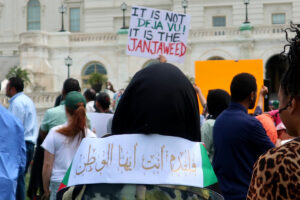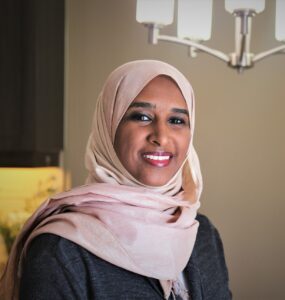Under the veil of darkness, a young couple and their two children drove slowly down a road in Khartoum, the car swerving carefully to avoid potholes and bodies strewn along the way. They were heading to Hajja Saadia’s*, the grandmother’s house in what they thought was a safer part of Khartoum after fighting had broken out in the North of the Sudanese capital. Unable to see well, the husband turned on the high beam. Seconds later, a barrage of bullets rained down on the car from the side of the road where a group of armed militia fighters were hiding in the darkness. Both parents were instantly killed. In the darkness, the startled cries of their two-year-old son and four-month-old daughter floated in the air.
It has been a whole year since the war in Sudan erupted on April 15th, 2023, in which the Sudanese Armed Forces (SAF) have been fighting a losing battle against the paramilitary Rapid Support Forces (RSF). RSF is a rebrand of the mercenary Janjaweed, originally a group of Arab nomadic tribes from West Sudan who were armed in the 1980s and then officially organized by the former regime of Omar al-Bashir to quell rebel movements of African origin in Darfur. Playing along ethnic lines and existing tensions between herders and pastoralists, the Janjaweed were empowered to commit several massacres – backed by the Sudanese government – in Darfur between 2003-2004 and again in 2014-15, prompting an investigation into genocide, war crimes and crimes against humanity by the International Criminal Court. They were also key players in the deadly clearing of the peaceful sit-in site in Khartoum in June 2019, where hundreds of protestors calling for a civilian government were killed, raped or many went missing. The armed group now comprises members from different countries and ethnic backgrounds.
Since the war erupted, both SAF and the Janjaweed have been indiscriminately attacking civilians and civilian infrastructure, killing more than 14,000 people and generating the worst wave of displacement in the world. Almost two million have been displaced into neighbouring countries, and over six million people have been internally displaced, many of them displaced several times as the Janjaweed move from state to state, burning their way across the country. Around 37% of the population – 17.7 million people – are staring famine in the face.
Background to the conflict
The Sudanese government initially organized the Janjaweed into the Rapid Support Forces that fought alongside and on behalf of the Sudan Armed Forces (SAF) and patrolled the national borders. But in 2017, the government passed a law that effectively legitimized them as an independent paramilitary force that answers to no one but the president himself. Following the deposition of former president Omar al-Bashir, a power-sharing agreement was reached between the Sudan Armed Forces and a transitional civilian government, and Mohamed Hamdan Dagalo – known as Himedti, leader of the Janjaweed – was appointed deputy of the Sovereign Council.
The power-sharing agreement dictated that the military would hand over power to civilians in October 2021, but expectedly, this agreement was revoked by the military and the Janjaweed who staged a full-scale coup, imprisoning the civilian government officials and murdering dozens of protestors over the following weeks. This kinship of evil between SAF and the Janjaweed unravelled when discussions over integrating Janjaweed fighters into the army and reigning in the latter’s power turned sour. On the morning of April 15th, all hell broke loose.
Putting lipstick on a crocodile
While the Janjaweed have been officially recognized locally and internationally as the Rapid Support Forces, providing fighters for Gulf countries and funded by the EU to curb illegal migration across Sudan and Libya, they have not come far from their origins of vicious guns for hire. The militia has continuously attempted to polish its bloody image over the years, signing agreements with the International Red Cross for the laughable training in humanitarian law and hiring multiple PR firms with millions of dollars to present the Janjaweed in a positive light, as well as lobby politicians in different countries on its behalf. But no amount of polishing can hide the atrocities the militia commit daily; atrocities that they proudly document themselves and share on social media platforms, making the original Janjaweed or devils-on-horseback a name they can never shake off.
Now the horses have been replaced by fleets of high-powered pickup trucks and tanks, and the simple rifles by high technology military-grade weaponry, funded by the Janjaweed’s complex financial network as well as generous backing from regional players with malicious interests in control Sudan’s most important natural resources: gold and agriculture. This financial might put the Janjaweed first on equal footing with the country’s malnourished official Armed Forces, then on a level superior to it, a fact that became painfully evident when fighting broke out between the two sides in April 2023 and the Janjaweed easily tore through Khartoum and Darfur in the early weeks facing little resistance from SAF.
As the armed conflict spread to multiple cities and villages across the country, the Janjaweed have invaded and hidden in neighborhoods after forcibly evicting people from their homes and killing them in the streets, camouflaging their cars to move around in, and kidnapping thousands of people for forced service and ransom. Suddenly, the Sudanese people became experts in discerning various types of weapons directed at them: GTS, Doshka, Kalashnikov, etc. And the most dreaded of all: Rape.
Rape as a weapon of war
Almost immediately after the Janjaweed invaded Sudan’s capital city Khartoum, reports of rape started trickling in. People were initially unsure of the magnitude and exact locations of the attacks and many stayed in their homes, only to be assaulted there by Janjaweed fighters who were going door to door. The documented cases of rape are just the tip of the iceberg, as women are often either incapable or hesitant to file complaints given the pervasive stigma they face, limited communication infrastructure, frequent blackouts hindering outreach, and the profound fear for their own and their families’ lives. Cases are documented with difficulty by the Unit To Combat Violence Against Women and organisations like the Strategic Initiative for Women in the Horn of Africa (SIHA).
But in Darfur, reports of rape and gang-rape of women and girls flooded in as the Janjaweed carried out a scorched earth campaign in the five Darfur states, annihilating entire villages and chasing fleeing civilians into neighbouring Chad. Victims of these attacks find little to no medical help for their injuries and risk grave complications, particularly if they fall pregnant. The number of reported rapes is estimated to be only 2% of the actual number of cases, putting this figure at around 44,000 back in August of 2023. These include reports of rape, gang rape, abductions, and being sold in sex-slave markets and forced into prostitution.
In December of 2023, SAF shockingly withdrew from Wad Madani in Gezira state in the face of the Janjaweed’s latest advancement, causing a massive exodus of people who had been displaced from Khartoum. Terrified families loaded the women and girls into boats, sending them across the river out of fear for their safety from the approaching militia fighters. Social media feeds were flooded with pleas for assistance in finding and re-locating missing family members, reports of people being shot in their homes, and panicked urgent requests for emergency contraception and anti-rape kits for protection against STDs and information on first aid for rape victims. And as the Janjaweed burned their way through the state, harrowing reports of rape have surfaced there are well.

Rape before the war
The Janjaweed militia has a longstanding history of sexual violence. They have used rape as an effective weapon for terror and humiliation for years, and their previous assaults on women and girls as young as eight years old were reported in previous massacres in Darfur under the protection of SAF and the Sudanese government. Disturbing hair-raising racist statements attributed to the ousted president Omar Albashir implied that Darfuri women should consider assaults by an Arab-Sudanese to be an honour.
The Janjaweed are not the only ones who have been using this atrocious weapon. For years, the greatly feared Sudanese intelligence and security apparatus, known for its intimidation tactics, used rape and sexual violence threats to quell dissent, kidnapping and assaulting activists like in the case of Safiya Ishag, and terrorizing protestors under both the former regime and post-revolution protests. Incidents involving attacks on women protestors implicated both the intelligence forces and the army. Yet, despite the palpable fear, Sudanese women stood their ground in advocating for civilian rule throughout the years.
Post-traumatic stress and unseen scars of war
Sudanese women not only bear the brunt of war physically and first-hand but also experience the trauma of losing loved ones and picking up the burden of caring for those left behind. Like Hajja Saadia, who lost her daughter and son-in-law on that tragic night. The cries of the children left behind were heard by neighbours, who pleaded with the fighters to allow them to rescue the little ones – who were covered in their dead mother’s blood – and later delivered them to their grandmother. Faced with the immense responsibility of caring for two orphans under the age of two, the grandmother made the difficult decision to leave everything behind and head for Egypt with no documentation for the children other than their birth certificates. She relived the trauma as her two-year-old grandson recounted what he had witnessed: Mama has a bobo here’ and Baba has a bobo here’, pointing to his head and belly.
This story is one of many and underscores the additional caregiving burdens shouldered by women of all ages amidst the ongoing war, compounding their grief over losing their loved ones, their homes, livelihood and dignity.
Silence of the international community
The global responses to the war have been the typical; restrained condemnation statements which have now trickled down to a complete stop. In response to reports of rape, the US Department of State issued a brief statement ‘strongly condemning’ conflict-related sexual violence. The United Nations criticized the surges in violence against women and girls. Despite these condemnations, reaching survivors, establishing safe spaces, distributing dignity kits, training service providers, and providing health care services in areas with disrupted physical access remain unmet.
Timely access to health services is crucial for survivors of sexual violence and war crimes. In Sudan, women activists emphasize the urgent need for increased resources for the clinical management of rape, including supplies of contraception medications, dignity kits, STI and Post-Exposure Prophylaxis kits to prevent HIV transmission. Ensuring that these essential items reach local clinics, community-based organizations, and key frontline responders is imperative, especially when survivors face stigma and shame and cannot access health facilities.
For women enduring the conflict within Sudan and those seeking refuge elsewhere, there is a pressing need for trauma-informed mental health and grief counseling support. These crucial services must be prioritized to address the well-being of survivors in these challenging circumstances. In the absence of a serious commitment from either side to stop the hostilities and protect civilians, the regional and international community must take serious steps to bring forward a sustainable ceasefire, provide humanitarian corridors and ensure accountability. With each passing day, the damage and destruction of lives and livelihoods only intensifies, and recovery becomes an even more distant dream.
*Alias
Feature photo:Zakariya Irfan / Shutterstock.com

Reem Gaafar is a public health physician, researcher and published writer. She is currently pursuing a PhD in Community Health Sciences at Ontario Tech University and lives in London, Ontario.
 Azza Eissa, MD, PhD, is a Clinician Scholar at the University of Toronto Department of Family Community Medicine. She is a Sudanese-born Canadian living in Toronto.
Azza Eissa, MD, PhD, is a Clinician Scholar at the University of Toronto Department of Family Community Medicine. She is a Sudanese-born Canadian living in Toronto.
